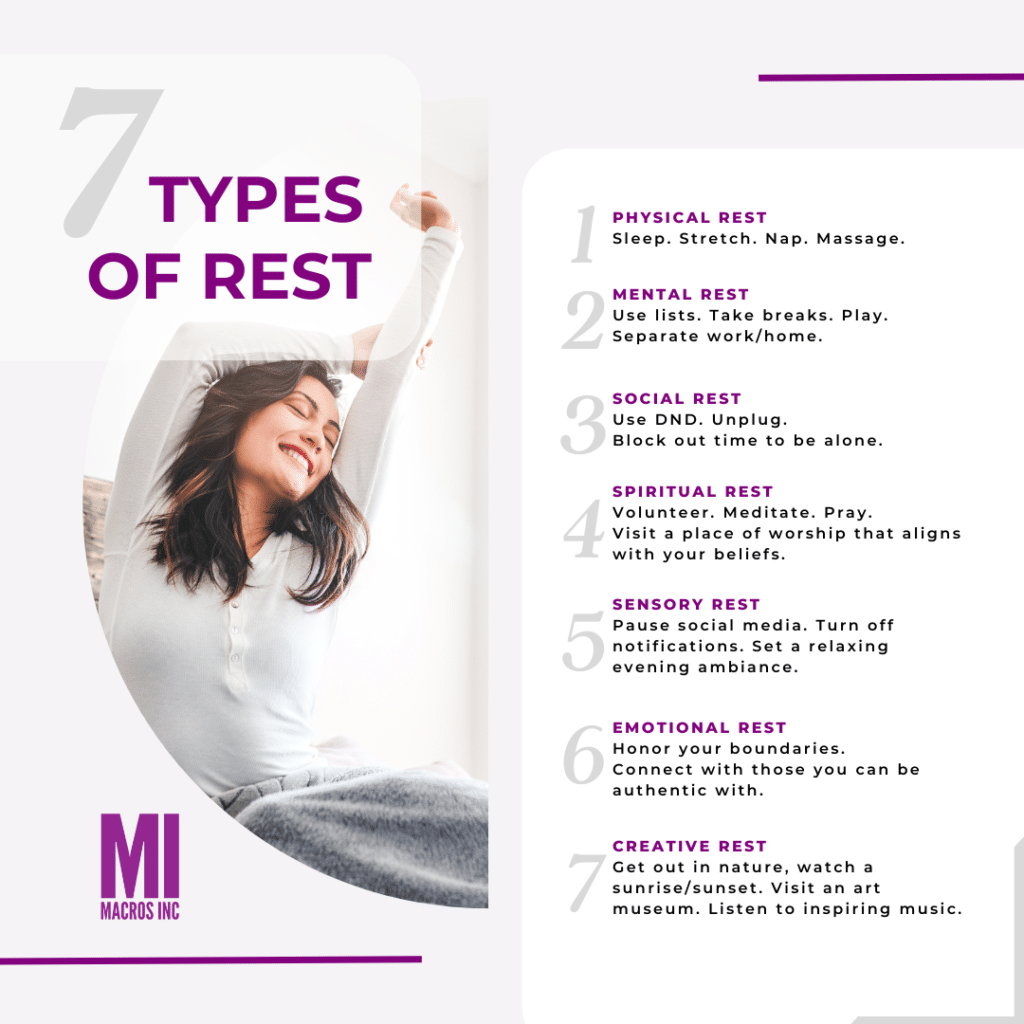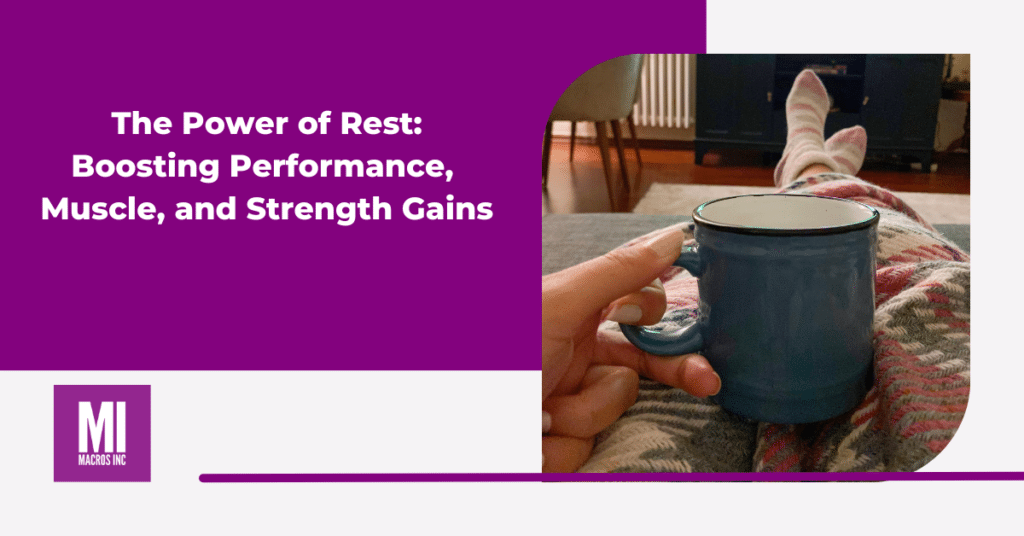In fitness and strength training, we often hear the mantra “no pain, no gain.” While it’s true that hard work and dedication are vital components of achieving fitness goals, there’s another crucial aspect that sometimes gets overlooked: rest days.
Today, we’ll explore why rest days are essential for improving performance, building muscle, and gaining strength. We’ll delve into the science of muscle recovery, the magic that happens during sleep, and how strategic rest can help you reach new heights in your fitness journey.
Jump to a Topic
The Science of Muscle Recovery
Your muscles undergo stress when you engage in workouts, whether it’s weightlifting, CrossFit, or circuit training. This may sound counterproductive, but it’s necessary for muscle growth. Repairing and rebuilding these muscle fibers increases muscle mass and strength over time. However, this process can only occur optimally with adequate rest.
During rest days, your body initiates the process of muscle recovery. This recovery phase involves several essential mechanisms:
1. Tissue Repair: Rest allows your body to repair and strengthen muscle tissue.
2. Protein Synthesis: Creating new muscle protein peaks during recovery. This is when your body utilizes amino acids in muscle fibers, contributing to muscle growth.
3. Glycogen Restoration: Intense workouts deplete your glycogen stores, essential for exercise energy. Rest helps replenish these energy reserves.
Understanding these recovery mechanisms underscores the necessity of rest in your training regimen. Without adequate downtime, the muscle repair and growth process is compromised, leading to diminished returns on your hard work.
This segues into the importance of not just rest days themselves, but also the critical role of a good night’s sleep in facilitating these recovery processes.
The Role of Sleep
One of the most critical aspects of rest is sleep. During sleep, your body undergoes remarkable processes that promote overall recovery and contribute significantly to your fitness goals.
1. Hormone Production: Sleep is when your body produces growth hormone (GH) and testosterone, two hormones crucial for muscle growth and repair. GH, in particular, peaks during deep sleep stages.
2. Neurological Recovery: Sleep enhances neural function and cognitive processes. This means better coordination, focus, and overall athletic performance.
3. Energy Conservation: Sleep helps conserve energy, ensuring you’re physically and mentally ready for your next workout.
4. Immune System Support: Adequate sleep bolsters your immune system, reducing the risk of illness or infection that can hinder your training progress.
The transformative power of sleep on your body’s recovery and performance capabilities highlights its non-negotiable role in any fitness journey.

Overtraining and the Dangers of Inadequate Rest
The “more is better” mentality can lead to under-recovering from training, where excessive exercise without sufficient rest can harm your body and fitness goals. Under-recovering from training session to training session can result in the following:
1. Stalled Progress: Instead of making gains, you might experience plateaus or regress in your fitness journey.
2. Increased Injury Risk: Overworked muscles and joints are more susceptible to injuries, which can set you back significantly.
3. Mental Burnout: Overtraining can lead to mental fatigue, reduced motivation, and even symptoms of depression and anxiety.
4. Hormonal Imbalance: Chronic overtraining can disrupt hormonal balance, leading to decreased muscle-building hormones and increased stress hormones like cortisol.
Recognizing the signs of overtraining is the first step in mitigating its risks, guiding us towards adopting strategies that not only prevent injury but also enhance overall wellbeing and performance.
Strategic Rest for Optimal Gains
So, how can you incorporate rest days into your fitness routine for maximum gains? Here are some key strategies:
1. Listen to Your Body: Pay attention to signs of overtraining, such as persistent fatigue, mood swings, or decreased performance. If you notice these signs, it’s time for a rest day.
2. Schedule Deload Weeks: Every few weeks, plan a deload week where you reduce the intensity and volume of your workouts. This helps prevent burnout and promotes recovery.
3. Prioritize Sleep: Aim for 7-9 hours each night of quality sleep. Create a sleep-conducive environment by keeping your bedroom dark, quiet, and cool.
4. Active Recovery: Consider light activities like walking, yoga, or swimming on rest days. These can aid in muscle recovery without adding excessive stress.
5. Nutrition Matters: Proper nutrition supports recovery, including post-workout meals rich in protein and carbohydrates. Hydration is equally crucial.
Adopting these strategies ensures that rest becomes an integral part of your training, not an afterthought. Listening to your body, scheduling deliberate rest periods, prioritizing sleep, engaging in active recovery, and maintaining proper nutrition work in concert to optimize your fitness gains.
This holistic approach to rest and recovery not only propels you towards your physical goals but also fosters a sustainable, healthy relationship with fitness
Conclusion
In pursuing fitness goals, remember that rest is not a sign of weakness but a crucial component of success. During rest days, your body repairs, grows, and strengthens.
By understanding the science of muscle recovery, harnessing the power of sleep, and incorporating strategic rest into your routine, you’ll unlock your full potential for improved performance, muscle gains, and strength. So, next time you hit the gym, remember rest is your secret weapon on the path to fitness greatness.
Try our nutrition coaching, for free!
Be the next success story. Over 30,000 have trusted Macros Inc to transform their health.
Simply fill out the form below to start your 14-day risk-free journey. Let's achieve your goals together!

